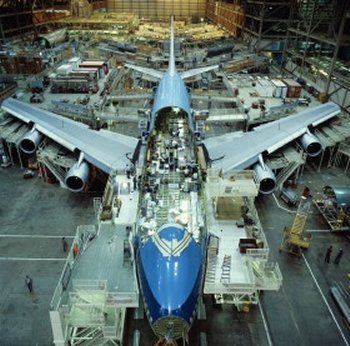
The United States' lead in aerospace is being
lost by offset
deals that send jobs and technology know-how
overseas.Any long-term expansion must produce enough
quality jobs to improve the lives of working families. Unless we
do it right, the U.S. economy could slip into an extended period
of slow growth and few new jobs.
Barry Bluestone, professor of Political Economy at
Northeastern University in Boston, MA, warns we need to assure
long-term economic growth, long-term prosperity and ensure that
growth is more evenly distributed.
What's the secret to long term growth?" asks Bluestone. It's
the public sector and the private sector working together to
create new technologies and new industries. The tremendous
investment in aircraft technology not only gave us the best
fighters and bombers, but the 707, the 727, McDonald Douglas and
Lockheed. There were enormous investments in education and in
public infrastructure from interstate highways to airports. Even
the internet was first developed by the Defense Department."
Bluestone contends that government spending on science and
infrastructure take decades to convert into everyday products
that consumers and businesses use. Heavy government investment
in the 1960s and 1970s propelled productivity and economic
growth in the 1990s.
The private sector converts basic research to applied
development. Local, state and federal governments invest in
education and training. That creates a labor force to
effectively use new technology," said Bluestone.
Today, conservative economists claim the U.S. economy
prospered because weaker trade unions kept wages low, expanding
imports kept prices low, and tight money kept inflation in
check. As corporate profits increased, the stock market boomed
and the economy grew. For them, future growth requires more of
the same medicine.
And yet, our greatest economic growth and prosperity came
with high rates of unionization and higher rates of government
spending on infrastructure, basic research, and education,
according to Bluestone.
We've forgotten that lesson," said Bluestone. It wasn't weak
trade unions, it wasn't free trade. It wasn't Alan Greenspan. It
was a technology-led revolution based on public sector dollars
that allowed the private sector to give us a boom.
Spending that we invested in education, training, new
technologies, and new industry was as high as 14 percent in
1968," said Bluestone. It's projected to be down to just about
five percent of Gross Domestic Product by 2004. We are
destroying the engine of economic growth."
For Bluestone, putting the nation on a sound footing means a
different set of priorities. We need public investment in basic
research and infrastructure. We need a higher minimum wage
because it helps consumption. We need labor law reform to foster
unionization and build economic security in the workplace. We
need fair trade not free trade. And we need to restore social
equity with universal health coverage and expanded public
services in transportation, daycare and eldercare to build a
society of growth with equity," he said.